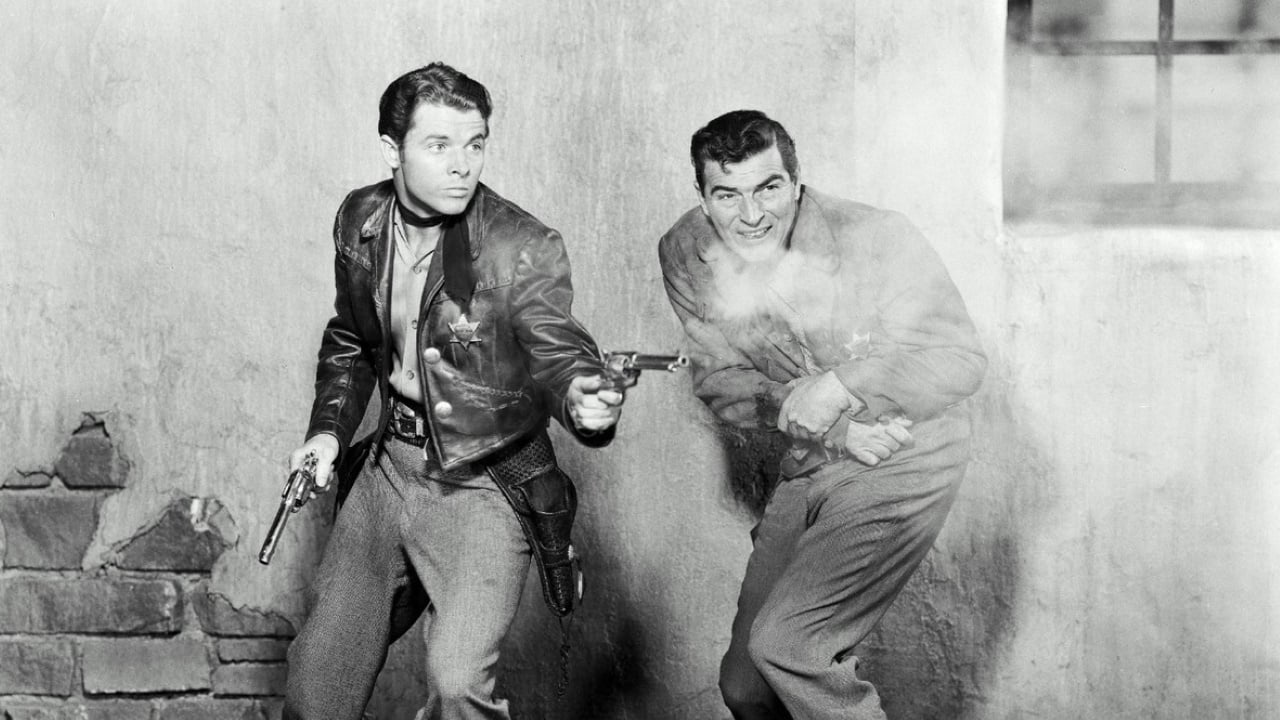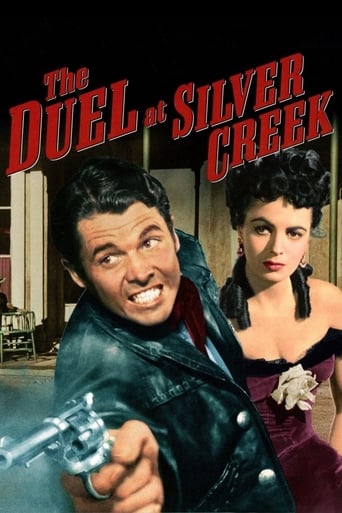

Good start, but then it gets ruined
... View MoreBad Acting and worse Bad Screenplay
... View MoreAt first rather annoying in its heavy emphasis on reenactments, this movie ultimately proves fascinating, simply because the complicated, highly dramatic tale it tells still almost defies belief.
... View MoreThis movie tries so hard to be funny, yet it falls flat every time. Just another example of recycled ideas repackaged with women in an attempt to appeal to a certain audience.
... View More"Big Steal" director Don Siegel's first western outing, "Duel at Silver Creek," bristles with gunfights galore, posses of dust-raising horsemen, and a hefty body count. Decorated World War II veteran Audie Murphy co-stars with Stephen McNally and Faith Domergue. Lee Marvin lurks on the periphery as a minor supporting character while perennial bad guy Gerald Mohr portrays the chief villain who leads a gang of homicidal henchmen. Friendship, deception, intrigue, and betrayal emerge as the major themes in this briskly-paced, 77-minute, Technicolor, horse opera that doesn't wear out its welcome. "Armored Car Robbery" scenarist Gerald Drayson Adams and "Buccaneer's Girl" scribe Joseph Hoffman have fashioned an interesting sagebrusher that takes advantage of several film noir elements. First, leading lady Faith Domergue is a murderous siren who takes McNally for a ride. Second, the McNally lawman provides the narration and endures the paranoia that comes with getting crippled by a bullet. "Duel at Silver Creek" was among the earliest westerns that used the gimmick of the gunman who had trouble pulling the trigger. This theme would become a convention during the 1950s. Third, the Silver Kid is a black, leather-coat clad trigger-happy gambler out for revenge that the McNally lawman exploits because he cannot reveal his own dark secret without jeopardizing his life. Indeed, while most of the action occurs during the day, a murder takes place at night. Nevertheless, "Duel at Silver Creek" could be classified as a film noir western.Against a vigorous montage of murder and mayhem, the narrator (Stephen McNally) establishes the conflict in "Duel at Silver Creek." He begins: "For some time there'd been reports about a vicious gang of claim jumpers who'd been forcing miners to sign away their claims through fear of torture or death. The claims were then transferred to one of their own men or were sold to innocent miners who had just arrived in the territory and were looking for new claims to work. These claim jumpers were smart enough not to try to grab some of the bigger mines where there might be enough men working to put up a fight. Usually, they picked on claims being worked by one or two men. And the more defenseless these men were, the better the claim jumpers liked it. Their plan was simple and foolproof, because nobody knew who they were. Since their victims either disappeared, or were found dead, there wasn't anyone who could put their finger on these jumpers. Working a claim became a might dangerous business for any miner because no one knew when or where they'd turn up next." Two miners are shot dead in cold blood by the claim jumpers. Luke Cromwell (Audie Murphy of "Comanche Creek") and his father have just made a gold strike when the claim jumpers ride up for their next foray. "There's enough dust there to blind a man. The jubilant father proclaims, "Looks like we staked one with some pay dirt this time, son!" The father beams with joy. "Now, you can buy all the silver you want. You won't have to go around playing poker for it." Rod Lacey (Gerald Mohr of "Invasion, U.S.A.") sends two men to ambush Luke after he rides away. Luke thwarts the two ambushers.McNally resumes his narration: "Then old man Tompkins struck it rich a few miles north of Silver City and the jumpers moved in and killed him. As usual, they made a clean getaway, but this time they left a trail I thought we could follow and as I was Marshal of Silver City, I decided to get up a posse to track them down." Marshal Tyrone's mentor, Dan 'Pop' Muzik (Griff Barnett of "Cass Timberlane"), wants to serve as marshal for Tyrone while the marshal is out with the posse. Tyrone leaves him in charge of Silver City. The posse runs down the claim jumpers, but Tyrone catches a slug in his right shoulder. The posse continues their pursuit, while Tyrone recuperates at Fort Lowell. He meets Opal Lacy (Faith Domergue of "Where Danger Lives") before she takes a stage to Silver City. The authorities bring a dying man to Fort Lowell and Opal offers to assist the physician. She sends the wounded Tyrone off on an errand. After the two men leave the man with Opal, she strangles him quickly.Later, she tells Tyrone that she is heading to Silver City to help her brother, Rod, run his mining business. When Tyrone returns, he learns that Pop was gunned down at night in the back. Immediately, Tyrone suspects the culprit in Pop's murder is a Mexican gunman named Johnny Sombrero (Eugene Iglesias of "The Brave Bulls") who has been a burr under his saddle. Rod provides Johnny with an alibi, and Opal suggests the killer may be the Silver Kid. "They say the Silver Kid is awfully fast with his guns," she warns Tyrone. Instead of arresting the Silver Kid (Audie Murphy), Tyrone deputizes him because he knows that he needs a fast gun to back him up.Opal strings along Tyrone. They call each other Brown Eyes and Lightning and he falls for him lock, stock and barrel. The Kid and Tyrone have an on-again, off-again relationship because he tries to convince the marshal that Brown Eyes is treacherous. Eventually, Tyrone learns about Brown Eyes' treachery. Initially, Tyrone believes that the Kid betrayed him when he informed Johnny about his inability to pull the trigger. The surprise ending where one of the heroes shoots the other one in the arm is clever, and Siegel and his writers ramrod a lot of exposition down our throats under the circumstances. Although Silver Creek is never seen, one character describes the setting for the finale as located near Silver Creek. Evidently, Universal Studios decided to bank on a sizzling, tell-all title like "Duel at Silver Creek" rather than something like "Duel near Silver Creek." The flavorful dialogue, especially the exchanges between Murphy and McNally, is quite good.
... View MoreThis is a very short movie but Don Siegel is that kind of director who can make the best of a 75 minutes film :remember what he did in "invasion of the body snatchers" the remakes of which could not match,in spite of a running time twice as long and a comfortable budget . This is a rather violent movie ,but anyway violence was one of Siegel 's trademarks :"the killers" nearly cut Siodmak's original.The movie begins with a series of murders committed by the claim jumpers in cold blood (including one by a woman!)This woman ,played by Faith Domergue is more original than the others :during the whole movie,the hero was had ;love is blind ,they say.Stephen McNally and Audie Murphy are convincing as is Lee Marvin (who would be scarier in "the killers" ) in a supporting part.
... View MoreDon Siegel's "Duel at Silver Creek" opens with vicious gang of claim jumpers let by a killer called Rod Lacy (Gerald Mohr) who'd been forcing miners to sign away their claims through fear of torture or death These claim jumpers were clever enough not to capture some of the bigger mines where there might be enough men working to put up a fight Usually they picked on the claims being worked by one or two men And more defenseless the men were, the better they liked it Their plan was simple and easy because no one knew who they were Since their victims either disappeared, or were found dead, there wasn't anyone who could put their finger on them One day, in the Tomahawks, the same gang forced Cromwell's old man to sign over the little claim he had and then they killed him Luke went after them and managed to get one of them before they shot his horse out from under him Then a few miles of Silver City, jumpers moved in and killed an old man who struck it rich As usual they made a clean getaway but this time they left a trail The Marshal of Silver City decided to get up a posse to track them down but the posse lost them in the chase and he took a bullet through his right shoulder So he was dropped off at the army hospital in Fort Lowell and they went back to town There Lightning met Opal Lacey who promised "Brown Eyes" she's going to find him a nuisance when he gets back in one week Audie Murphy plays Silver Kid/Luke Cromwell He didn't have the face of a killer but he had the cold steel look of one His hands are quick and sure All he knows is how to handle a six-gun and poker Faith Domergue plays Opal Lacy, the elegant woman with a secret agenda and a brother who's a mining engineer Stephen McNally plays the famous Marshal who wasn't interested in the Kid's poker, but he was interested in the way he handled a six-gun He needed a right hand and he had the fastest one he ever saw He didn't see it dangerous to make him his deputy Susan Cabot plays Dusty Fargo, the innocent girl who takes care of the Marshal better than many a wife he knows Eugene Iglesias plays Johnny Sombrero, the hypocrite man who looks mighty happy about something maybe for the 'gift' of love he just made that night to prove he'd accomplished it to the girl he wants
... View MoreDon Siegel directed a delightful, fast paced, fun western, with tongue firmly in cheek. Audie Murphy isn't half bad as the poker-loving "Silver Kid", dressed in black leather. Featured are several unique characters like "Johnny Sombrero", who wears extravagant clothes, combs his hair up,and of course puts on a large sombrero. The script makes fun of all the western clichés, camping it up while moving the story briskly. Faith Domergue is alluringly devious and mean as the bad girl and love interest. Lee Marvin has a small but remarkable role, and sports a big mustache. I like the way the straight hero is played for a fool until the end, and his poker playing sidekick gets all the action and glory. Siegel, as usual, excels with the action scenes, but this is not a thriller per say, more a fast paced action romp very similar in style to "The Big Steal", which Siegel directed before this film. I really enjoyed it.
... View More